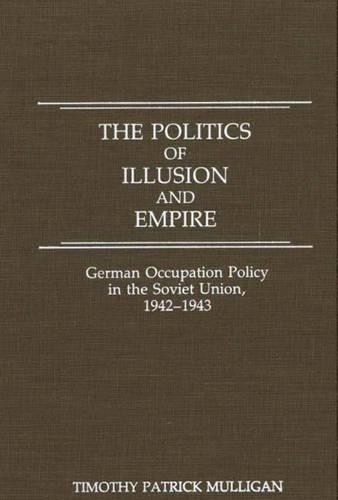
The Politics of Illusion and Empire: German Occupation Policy in the Soviet Union, 1942-1943
(Hardback)
Publishing Details
The Politics of Illusion and Empire: German Occupation Policy in the Soviet Union, 1942-1943
By (Author) Timothy Mulligan
Bloomsbury Publishing PLC
Praeger Publishers Inc
21st April 1988
United States
Classifications
Tertiary Education
Non Fiction
Second World War
Modern warfare
940.5347
Physical Properties
Hardback
220
Width 156mm, Height 235mm
539g
Description
Western historians have traditionally depicted Germany's World War II policy on the Eastern front as simply a missed opportunity. According to this view, the Germans had only to take advantage of anti-Stalinist and anti-Bolshevik sentiment to insure a bloodless victory. The Politics of Illusion and Empire demonstrates that the German position was much more complex than is usually presented. This well-documented monograph centers on the critical nine month period from the autumn of 1942 to the summer of 1943. It examines the attitudes, efforts, and limitations of German civil and military officials during this time. The author describes foreign pressure for Eastern policy reform and the proposals for that reform. Mulligan also discusses agrarian reforms, German economic policies, and the crisis of the German anti-partisan effort, relating these efforts to Hitler's military strategy during this period. The conclusions point to the implausibility of the bloodless victory and support the revisionist approach to German economic and military policies of the time.
Reviews
Mulligan's study examines the attempts by various individuals and groups in German military and civilian agencies to adopt a more pragmatic occupation policy in the Soviet Union after 1941. It confirms the traditional view of the administrative chaos of National Socialist Germany, and the racial basis of Hitler's policy in the east. The author, a staff member at the National Archives, provides a thorough discussion of the limited and temporary successes achieved by the reformers. Their efforts enabled the German military, whatever the intentions of its commanders, to prolong the war with all the consequences that this entailed for Jews, Germans, Russians, and others. Fortunately for the rest of the world, these changes were frustrated by the Red Army and by Hitler's refusal to compromise. Students of the history of WW II are in Mulligan's debt for the thoroughness of his research and, more important, for the provocative questions raised by his work. For upper-division undergraduates and above.-Choice
"Mulligan's study examines the attempts by various individuals and groups in German military and civilian agencies to adopt a more pragmatic occupation policy in the Soviet Union after 1941. It confirms the traditional view of the administrative chaos of National Socialist Germany, and the racial basis of Hitler's policy in the east. The author, a staff member at the National Archives, provides a thorough discussion of the limited and temporary successes achieved by the reformers. Their efforts enabled the German military, whatever the intentions of its commanders, to prolong the war with all the consequences that this entailed for Jews, Germans, Russians, and others. Fortunately for the rest of the world, these changes were frustrated by the Red Army and by Hitler's refusal to compromise. Students of the history of WW II are in Mulligan's debt for the thoroughness of his research and, more important, for the provocative questions raised by his work. For upper-division undergraduates and above."-Choice
Author Bio
TIMOTHY PATRICK MULLIGAN is an archivist at the National Archives and Records Administration.
